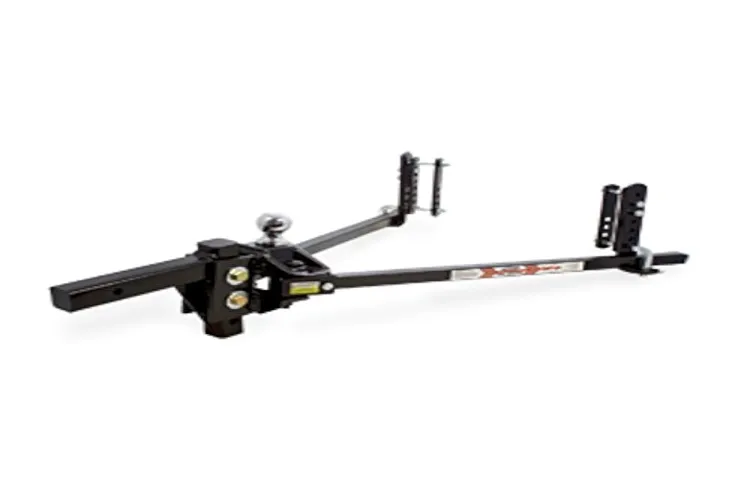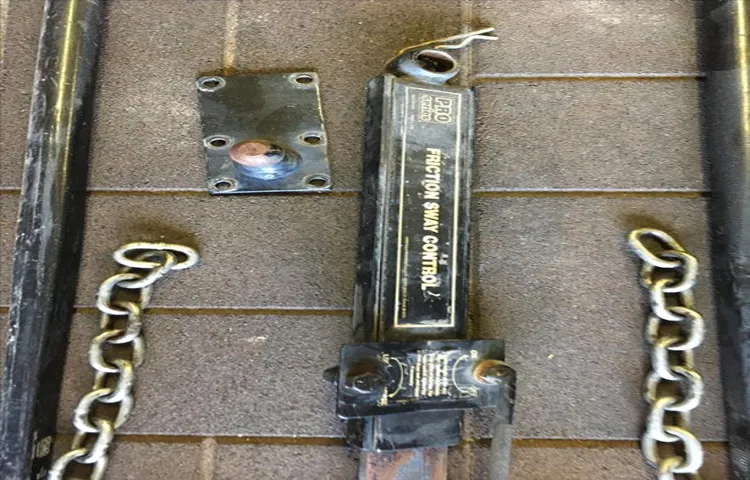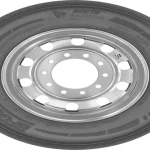Have you ever wondered how people are able to tow heavy trailers and keep their vehicles stable? Well, the secret lies in using an equalizer hitch. An equalizer hitch, also known as a weight distribution hitch, is a device that helps distribute the weight of a trailer evenly across all axles of the towing vehicle. It essentially “equalizes” the weight, making it easier and safer to tow heavy loads.
Imagine you’re carrying a heavy backpack on one shoulder. The weight is concentrated on that one side, causing strain on your back and throwing off your balance. Now, imagine if you had a backpack with straps that spread the weight evenly across both shoulders.
It would be much more comfortable and easier to carry, right? That’s exactly what an equalizer hitch does for your vehicle and trailer. By evenly distributing the weight, an equalizer hitch helps to stabilize your vehicle and eliminate any swaying or bouncing that might occur while towing. This not only improves the overall towing experience but also enhances safety on the road.
It ensures that the weight is properly distributed, preventing excessive strain on the tires, suspension, and brakes of the towing vehicle. So how does an equalizer hitch work? Well, it consists of several components, including spring bars, sway control, and a hitch head. The spring bars are responsible for distributing the weight between the trailer and the towing vehicle.
They exert upward force on the rear of the towing vehicle and downward force on the trailer, keeping everything balanced. In addition to weight distribution, an equalizer hitch also provides sway control. Sway control devices help to minimize the side-to-side movement of the trailer, reducing the chances of a dangerous sway or fishtailing situation.
This is especially important when towing in windy conditions or when passing large vehicles. Overall, an equalizer hitch is a crucial tool for anyone who tows heavy trailers or recreational vehicles. It offers improved stability, better weight distribution, and enhanced control while towing.
Table of Contents
Types of Equalizer Hitches
When it comes to choosing the right equalizer hitch for your towing needs, there are a few different types to consider. One type is a weight distribution hitch, which is designed to evenly distribute the weight of your trailer across all four wheels of your towing vehicle. This can help to improve stability and control while towing, especially when dealing with heavy or unbalanced loads.
Another type is a sway control hitch, which is designed to reduce or eliminate the swaying motion that can occur when towing a trailer. This can be particularly useful when traveling at high speeds or in windy conditions. Finally, there are also adjustable hitches, which allow you to fine-tune the weight distribution and sway control settings to best suit your specific towing needs.
These hitches feature adjustable tension bars or other mechanisms that can be easily adjusted to provide the optimal level of stability and control. So, when it comes to choosing an equalizer hitch, think about the weight distribution, sway control, and adjustability that you need for your towing situation.
Weight Distribution Hitches
equalizer hitches, weight distribution hitches, types of equalizer hitches, weight distribution system, sway control, trailer towing, adjustable hitches Weight distribution hitches, also known as equalizer hitches, are an essential component of any trailer towing setup. They help to distribute the weight of the trailer more evenly across the towing vehicle, resulting in a safer and more stable towing experience. There are several types of equalizer hitches available, each with its own unique features and benefits.
One of the most common types is the round bar hitch. This type of hitch uses round bars that are inserted into the hitch receiver on the towing vehicle and then attached to the trailer’s frame. The bars help to distribute the weight of the trailer and keep it level, reducing the strain on the tow vehicle’s suspension.
Another type of equalizer hitch is the trunnion bar hitch. This hitch works in a similar way to the round bar hitch but uses trunnion bars instead. Trunnion bars offer more ground clearance and are ideal for towing in off-road or uneven terrain.
For those seeking even more control and stability, there are weight distribution hitches with sway control. Sway control hitches use additional devices, such as friction sway control or dual cam sway control, to reduce trailer sway caused by crosswinds or passing vehicles. These systems help to keep the trailer in line with the tow vehicle, preventing dangerous swaying and ensuring a smoother, more controlled towing experience.
Adjustable hitches are also available, allowing you to fine-tune the weight distribution system to suit your specific towing needs. These hitches allow for precise adjustment of the weight distribution and sway control, ensuring optimal safety and performance. In summary, weight distribution hitches, or equalizer hitches, are crucial for maintaining a safe and stable towing experience.
The different types of hitches, such as round bar, trunnion bar, and adjustable hitches, offer various benefits and features. Sway control hitches provide additional stability, reducing trailer sway. By investing in the right weight distribution hitch, you can enhance your trailer towing experience and enjoy the peace of mind that comes with knowing you’re towing safely and securely.

Sway Control Hitches
“In the world of towing, safety is paramount. One essential component of safe towing is a sway control hitch. These hitches are designed to reduce and eliminate trailer sway, providing a smoother and more stable towing experience.
There are several types of sway control hitches, including the popular equalizer hitch. The equalizer hitch is comprised of a weight distribution system, sway control system, and spring bars. This type of hitch distributes the weight evenly between the tow vehicle and the trailer, ensuring that the load is properly balanced.
The sway control system helps to minimize any side-to-side movement, keeping the trailer in line with the tow vehicle. With the use of spring bars, the equalizer hitch provides additional stability and control, reducing the risk of sway. Different equalizer hitches may have varying features and capabilities, so it’s important to choose one that is suitable for your specific towing needs.
Whether you’re towing a small camper or a large RV, an equalizer hitch can greatly improve your towing experience and provide peace of mind on the road.”
Factors to Consider
When it comes to choosing the right kind of equalizer hitch for your needs, there are several factors you should consider. First and foremost, you need to know the weight capacity of your trailer and the towing capacity of your vehicle. These numbers will determine the type of hitch and weight distribution system you will need.
Additionally, you should also consider the type of terrain you will be towing on. If you frequently encounter steep hills or uneven roads, you may want to invest in a hitch with built-in sway control to ensure stability. Another factor to consider is your level of towing experience.
If you are new to towing, you may want to opt for a hitch that is easier to install and adjust. Lastly, don’t forget to take into account your budget. There are a wide range of equalizer hitches available at various price points, so be sure to choose one that fits within your budget without compromising on quality and safety.
Gross Trailer Weight
Gross Trailer Weight, also known as GTW, is a crucial factor to consider when towing any type of trailer. It refers to the maximum weight that a trailer can safely carry, including the weight of the trailer itself and any cargo or passengers inside. When determining the GTW, there are several factors that need to be taken into account.
Firstly, the towing vehicle’s towing capacity is essential. It is important to ensure that the GTW does not exceed the towing capacity of the vehicle. Secondly, the type of trailer hitch being used plays a significant role.
Different types of hitches have different weight ratings, and it is vital to select a hitch that can handle the GTW. Additionally, the weight distribution of the cargo inside the trailer must be considered. Uneven weight distribution can put unnecessary strain on the trailer and towing vehicle.
Lastly, proper maintenance of both the trailer and the towing vehicle is crucial. Regular checks on tire pressure, brakes, and suspension are necessary to ensure safe towing. By considering these factors, individuals can ensure that they are towing within the limits of their equipment’s GTW and promoting a safe journey.
Tongue Weight
tongue weight, factors to consider
Vehicle’s Hitch Capacity
hitch capacity When it comes to towing a trailer or hauling heavy loads, the hitch capacity of your vehicle is a crucial factor to consider. Not all vehicles are created equal in terms of their ability to handle heavy loads, so it’s important to understand the factors that can affect hitch capacity. One key factor is the type of hitch that your vehicle has.
There are different classes of hitches, ranging from Class I to Class V, with each class having a specific weight capacity. Another factor to consider is the weight distribution of the load. If the load is not properly distributed, it can put excessive strain on the hitch and affect its capacity.
Additionally, the overall weight of your vehicle itself can influence the hitch capacity. So, it’s important to know the weight limits specified by the vehicle manufacturer and to never exceed them. Taking these factors into consideration will help ensure that you choose the right hitch and tow within its capacity, providing a safe and reliable towing experience.
Trailer Length
trailer length
Choosing the Right Equalizer Hitch
When it comes to choosing the right equalizer hitch, it’s important to consider a few key factors. First and foremost, you’ll want to determine the weight rating of your trailer and the towing capacity of your vehicle. This will help you determine the appropriate weight distribution and sway control capabilities you’ll need in an equalizer hitch.
Additionally, you’ll want to consider the type of trailer you’ll be towing. Different trailers have different hitching requirements, so be sure to choose an equalizer hitch that is compatible with your specific trailer type. Finally, consider your own level of towing experience and comfort.
If you’re new to towing or prefer a smoother, more stable ride, you may want to invest in a higher-quality equalizer hitch with advanced features and technology. Overall, the key is to choose an equalizer hitch that meets your specific towing needs and provides the safety and control you desire.
Weight Ratings
choosing the right equalizer hitch
Sway Control
equalizer hitch, sway control, choosing the right equipment
Features and Add-ons
equalizer hitch, features, add-ons, choosing the right equalizer hitch
Installation and Maintenance
When it comes to towing a trailer or RV, having the right equalizer hitch is essential for a safe and smooth ride. But with so many options on the market, it can be overwhelming to figure out what kind of equalizer hitch you need. The type of hitch you choose will depend on several factors, including the weight of your trailer, the towing capacity of your vehicle, and your own personal preferences.
A good starting point is to determine the tongue weight of your trailer, which is the amount of weight that presses down on the hitch. This can be measured by placing a scale under the trailer’s tongue and ensuring it falls within the recommended range for your hitch. Additionally, you’ll want to consider features such as sway control, which helps to prevent your trailer from swaying back and forth while on the road.
Ultimately, it’s important to do your research and consult with a professional to ensure you select the right equalizer hitch for your specific towing needs.
Setup and Adjustment
installation and maintenance
Regular Inspections
Regular inspections are an essential part of ensuring the efficient and safe operation of any installation or system. Whether it’s a heating or cooling system, an electrical system, or even a plumbing system, regular inspections can help identify potential issues before they become major problems. These inspections can be conducted by a trained professional or by the homeowner themselves, but regardless of who performs the inspection, it is important to have a checklist of items to look for.
These can include checking for leaks, loose connections, worn-out components, and any signs of damage or deterioration. By conducting regular inspections, homeowners can catch potential issues early on and take the necessary steps to address them, saving time and money in the long run. Additionally, regular inspections can also help ensure that the system is operating at its optimal efficiency, which can result in lower utility bills and a more comfortable living environment.
So, don’t wait until something goes wrong – make regular inspections a priority to ensure the longevity and reliability of your installations.
Lubrication
“installation and maintenance of lubrication systems” Prompt: Discuss the importance of proper installation and maintenance when it comes to lubrication systems. Proper installation and maintenance of lubrication systems are crucial for the smooth functioning of machinery and equipment. When it comes to installation, it is essential to follow the manufacturer’s guidelines and recommendations.
This ensures that the system is correctly set up and that all components are properly aligned and connected. It is also important to choose the right type of lubricant and ensure that it is used in the correct quantities. Regular maintenance is equally important to keep the lubrication system in optimal condition.
This includes regular inspection of the system, checking for leaks or blockages, and replacing any damaged or worn-out parts. Additionally, regular lubricant analysis should be conducted to monitor its condition and identify any potential issues early on. By prioritizing proper installation and maintenance of lubrication systems, businesses can prevent costly breakdowns, extend the lifespan of machinery, and improve overall operational efficiency.
Conclusion
So, ladies and gentlemen, after going through the complexities of different types of equalizer hitches, you might still find yourselves scratching your heads and wondering, “What kind of equalizer hitch do I need?” Fear not, for I am here to deliver a conclusion that will leave you both satisfied and amused. Choosing the right equalizer hitch is a bit like finding the perfect partner. You want someone who can lift you up when you’re feeling down, provide stability when things get a little shaky, and most importantly, keep you in balance in the face of any challenge.
And just like with relationships, it’s all about compatibility. You need to find the equalizer hitch that matches your specific trailer’s weight and the capacity of your tow vehicle. Think of it as a dance between your trailer and your tow vehicle.
You want them to move gracefully together, swaying to the rhythm of the road, all while ensuring that neither one steps on the other’s toes. It’s a delicate art, my friends, but with the right equalizer hitch, you can achieve a harmony that would make even the most seasoned ballroom dancer jealous. Now, when it comes to picking the perfect equalizer hitch, you might be tempted to go for the flashiest option or the one with the most impressive features.
But let me tell you a little secret – it’s not all about looks and bells and whistles. What really matters is finding the hitch that suits your towing needs and can handle the weight distribution like a pro. So, whether you’re towing a petite camper or a monstrous travel trailer, remember that the key to a successful towing experience lies in the right equalizer hitch.
Be diligent in your research, consult the experts, and make a choice that will ensure a smooth ride every time. Trust me, there’s nothing more satisfying than knowing you’ve got the perfect hitch to keep your trailer and tow vehicle in sync, like Fred Astaire and Ginger Rogers gliding across the silver screen. So, my dear towing enthusiasts, I hope this witty and clever explanation has shed some light on the mysterious world of equalizer hitches.
May your towing adventures be as smooth as satin and your dance with the road be a waltz of perfection. Happy towing, and remember – with the right equalizer hitch, you’ll be the king or queen of the open road!”
FAQs
What is an equalizer hitch?
An equalizer hitch, also known as a weight distribution hitch, is a device that helps evenly distribute the weight of a trailer by transferring some of the weight to the front axle of the towing vehicle.
Why do I need an equalizer hitch?
You need an equalizer hitch if you are planning to tow a trailer that is relatively heavy in comparison to the towing vehicle. This will help improve stability and control while towing, ensuring a safer and more comfortable towing experience.
How does an equalizer hitch work?
An equalizer hitch works by using spring bars or torsion bars to redistribute the weight from the rear axle of the towing vehicle to the front axle and the trailer axles. This helps level the vehicle and trailer, providing better weight distribution and reducing sway.
What are the advantages of using an equalizer hitch?
Using an equalizer hitch offers several advantages including improved towing stability, reduced sway, better control and handling, and improved braking performance. It also helps prevent uneven tire wear and adds extra ground clearance to the rear of the vehicle.
How do I choose the right type of equalizer hitch for my towing needs?
Choosing the right type of equalizer hitch depends on various factors such as the weight of your trailer, the tongue weight, the towing vehicle’s towing capacity, and the type of trailer hitch receiver on your vehicle. It is recommended to consult with a professional or refer to the manufacturer’s guidelines for selecting the appropriate equalizer hitch.
Are there different sizes or weight classes for equalizer hitches?
Yes, equalizer hitches come in different weight classes to accommodate various trailer sizes and weights. It is important to choose an equalizer hitch that matches the specific weight capacity of your trailer and towing vehicle.
Can I use an equalizer hitch on any type of trailer?
Equalizer hitches are suitable for most types of trailers including travel trailers, camping trailers, boat trailers, and utility trailers. However, it is important to ensure that the trailer hitch receiver on your towing vehicle is compatible with the equalizer hitch.



